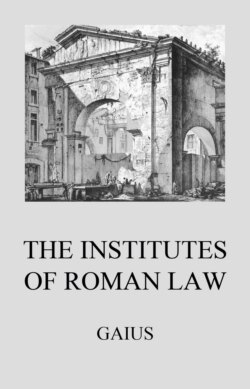Читать книгу Institutes of Roman Law - Gaius - Страница 30
На сайте Литреса книга снята с продажи.
ОглавлениеDE LEGITIMA PATRONORVM TVTELA.
§ 165. The same statute of the Twelve Tables assigns the guardianship of freedwomen and of freedmen below the age of puberty to the patron and the patron’s children, and this guardianship, like that of agnates, is called statutory guardianship, not that it is anywhere expressly enacted in the Twelve Tables, but because the interpretation has procured for it as much reception as it would have obtained from express enactment; for the fact that the statute gave the succession of a freedman or freedwoman, when they die intestate, to the patron and patron’s children, was deemed by the lawyers of the republic (veteres) a proof that it intended to give them the guardianship also, because the Tables, when they call agnates to succeed to the inheritance, likewise confer on them the guardianship.
§ 166. The analogy of the patron guardian led in its turn to the establishment of other guardianships also called statutory. Thus when a person mancipates to another, on condition of remancipation to himself, either a son or grandson through a son, who are below the age of puberty, or a daughter or granddaughter through a son of whatever age they may be, he becomes their statutory guardian when he manumits them after remancipation.
§ 166 a. CONCERNING FIDUCIARY GUARDIANSHIP. But there are other kinds of guardianship, called fiduciary, which arise when a free person has been mancipated by his parent or coemptionator to an alienee and manumitted by the latter.
§ 167. The guardianship of Latins, male or female, below the age of puberty, does not necessarily belong to their manumitter, but on whoever before manumission was their quiritary owner. Accordingly, a female slave belonging to you as quiritary owner, to me as bonitary owner, if manumitted by me without your joining in the manumission, becomes a Latin, and her property belongs to me, but her guardianship to you, by the enactment of the lex Junia. If the slave is made a Latin by one who combines the character of bonitary and quiritary owner, both her effects, and the guardianship of her, belong to one and the same person.
§ 164 a. As in default of agnates the inheritance by the law of the Twelve Tables devolved on the gens it may be inferred by the reasoning adopted in § 165 that the guardianship passed to it also. So it is probable that at the beginning of the lacuna Gaius made mention of the statutory guardianship of the Gentiles, and that this is the passage on the subject referred to in 3, 17. As to the nature of the gens, see Introduction.
§ 166 a. Cf. §§ 115, 175, 195 a.
§ 167. It seems anomalous that a Latin, i.e. a non-civis, should have been a subject of wardship: for as tutela is an institute of jus civile (§§ 142, comm., 189), i.e. jus civium, we should have expected that, as in the case of patria potestas, both pater and filius must be cives Romani, § 128, so here both parties, the ward as well as the guardian, must of necessity be cives Romani. The anomaly, however, was expressly enacted by the lex Junia: which further departed from the law of the Twelve Tables by separating the guardianship from the right of succession; for it gave the guardianship to the person who before the manumission had been quiritary owner, but the right of succession to the person who had previously been bonitary owner. Latinus was not only capable of being a ward, but also of being a guardian, Fragmenta Vaticana, 193; that is, though he was incapable of being a testamentary guardian, § 23, he could, it would seem, be made a tutor dativus, that is, appointed by a magistrate, § 185.
